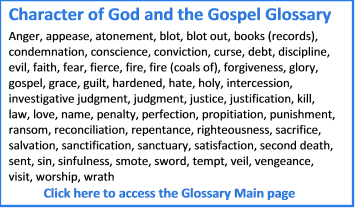Mark – definition

understanding of the character of God and the Gospel.
Traditional Legal Model – Mark as in “the mark of the beast” is often connected with Sunday worship. Sometimes (incorrectly) it is seen as an outward symbol on the forehead.
Biblical Healing Model – There is the day of worship connection but mark, in this context, is also connected to character. Those who have the mark of the beast will have a character to match the beast while those who have the seal of God will have the character of God.
Dictionaries do not define “mark” as used in the phrase “mark of the beast.”
“And he causeth all, both small and great, rich and poor, free and bond, to receive a mark (G5480) in their right hand, or in their foreheads: And that no man might buy or sell, save he that had the mark (G5480), or the name of the beast, or the number of his name.” (Rev 13:16-17)
Here is the definition for the original Greek word for “mark,” (“charagma”) and two related words from https://www.messie2vie.fr/bible/strongs:
5480 charagma χάραγμα (from the same as G5482) – a scratch or etching, i.e., stamp (as a badge of servitude), or sculptured figure (statue)
5481 charakter χαρακτήρ (from the same as G5482) – a graver (the tool or the person), i.e., (by implication) engraving (“character”), the figure stamped, i.e., an exact copy or (figuratively) representation)
5482 charax χάραξ – a stake, i.e., (by implication) a palisade or rampart (military mound for circumvallation in a siege)
Notice for 5480: “a badge of servitude” as in “who do you serve?”
These three words (5480, 5481, 5482) are all related. The English word “character” does not appear in the KJV but notice the Greek word G5481 above – “charakter.” It appears only once in the Bible:
“Who being the brightness of his glory, and the express image (G5481) of his person, and upholding all things by the word of his power, when he had by himself purged our sins, sat down on the right hand of the Majesty on high;” (Heb 1:3)
We could say from that: “Jesus is the brightness of His Father’s glory and the ‘charakter’ of His Father’s person.”
Dictionary.com states that the origin of the English word “character” is the Greek word charakter:
1275–1325; <Latin <Greek charaktḗr graving tool, its mark, equivalent to charak- (base of charáttein to engrave) + -tēr agent suffix; replacing Middle English caractere<Middle French <Latin, as above
It seems legitimate to say the Son has the same character as His Father and there are many other verses supporting that. Now look at this verse:
“Who (Jesus) is the image (G1504) of the invisible God, the firstborn of every creature:” (Col 1:15)
“Image” is from the Greek word “eikon” (G1504) with the meaning “an image, figure, likeness.” So, we can see that Col 1:15 is saying much the same as (Heb 1:3): Jesus has the “image,” “the express image,” or the likeness of His Father. “Eikon” is also used in this verse:
“And the first went, and poured out his vial upon the earth; and there fell a noisome and grievous sore upon the men which had the mark of the beast, and upon them which worshipped his (the beast’s) image (eikon).” (Rev 16:2)
If “eikon” can mean character as suggested above, could worship of the image of the beast be equivalent to worshipping (putting value on) his character?
Summarizing the material above:
- Jesus is the express image (“charakter”) of His Father (Heb 1:3)
- “Charakter” is the source of the English word “character”
- So Jesus has the character (English equivalent of “charakter”) of His Father
- Jesus is also the image (“eikon” = likeness) of His Father (Col 1:15)
- So “eikon” (likeness) and “charakter” (character) are similar.
- People will worship the image (“eikon” – likeness/character) of the beast (Rev 16:2)
- People who value/worship that image will become like or take on the character of the beast.
The Effect of Worship
Let’s consider the last point in the list above more closely. Could worshipping the image of the beast include have the meaning of putting value or worth on the character of the beast? What is it that we worship about God? What does worship mean?
Worship = worth + ship
worth = worthiness, value
-ship as a suffix means the state or condition of being something as in:
friendship = the state of being a friend
apprenticeship = the condition of being an apprentice
relationship = the state of being related
We worship someone/something that we consider to be worthy or of value. And we tend to become like that which we value:
“But we all, with open face beholding as in a glass the glory of the Lord, are changed into the same image from glory to glory, even as by the Spirit of the Lord.” (2 Cor 3:18)
That is often referred to as “the beholding principle” which is well-documented. That this effect will be a factor for God’s people is shown by this verse:
“Beloved, now are we the sons of God, and it doth not yet appear what we shall be: but we know that, when he shall appear, we shall be like him; for we shall see him as he is.” (1 John 3:2)
And this advice is given (for good reason):
“Finally, brethren, whatsoever things are true, whatsoever things are honest, whatsoever things are just, whatsoever things are pure, whatsoever things are lovely, whatsoever things are of good report; if there be any virtue, and if there be any praise, think on these things.” (Phil 4:8)
 Notice that the mark of the beast is received in the forehead, not on it. It is not a physical mark. This is not the mark of the beast as some claim:
Notice that the mark of the beast is received in the forehead, not on it. It is not a physical mark. This is not the mark of the beast as some claim:
So, while many understand the mark of the beast to be connected with Sunday worship in contrast to the Biblical Sabbath, it seems there also may be a connection to character. To worship the beast is to put value on and become like his character. Worship of God, on the other hand, will make one more like Him.
Likely, no one reading this website would profess to or knowingly worship the beast. However, holding erroneous concepts of the character of God which are actually characteristic of the beast will tend to influence one towards that character and, ultimately, to accept the mark of the beast. Be sure you take the time to correctly understand the character of God.
Return to the Character of God and the Gospel Glossary Index

August 4, 2021 @ 9:50 pm
Like your teaching.
September 25, 2021 @ 2:51 am
Excellent exposition of the word mark and how character is linked with it. This makes it easy to understand “mark of the beast” referred to in Revelation 13:16-18.
This is is in harmony with Parable of sheep and goat. One is free to have the character of sheep or goat. Character of sheep is same as that of character of Christ and of God.
October 8, 2021 @ 11:46 am
Good teaching.
April 6, 2022 @ 4:01 pm
The spirit says the mark or character of the Beast has always been with us. Cain. Seth means substitute. Now please read Genesis 3:6 and then see all that is in the world 1 John 2:16. Then shall the scales fall from your eyes as mine like Paul on the road to Damascus, who I believe wrote Hebrews, others do not, but I digress. This is my testimony and Christ is Love. Thanks for the post.
April 8, 2022 @ 9:50 am
Hi Benjamin
Thank you for commenting. You are making the same comparison that I did in my booklet The Lake of Fire and the Second Death available at https://characterofgod.org/resources#lake-of-fire. See page 22.